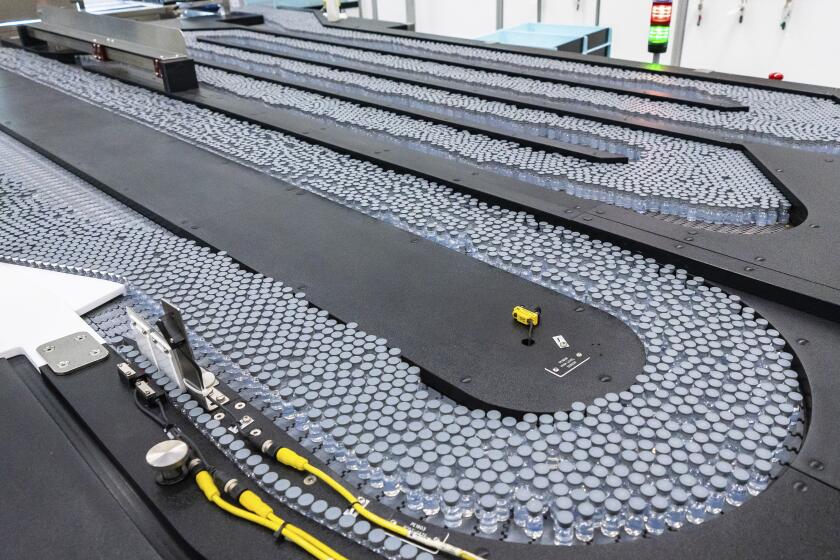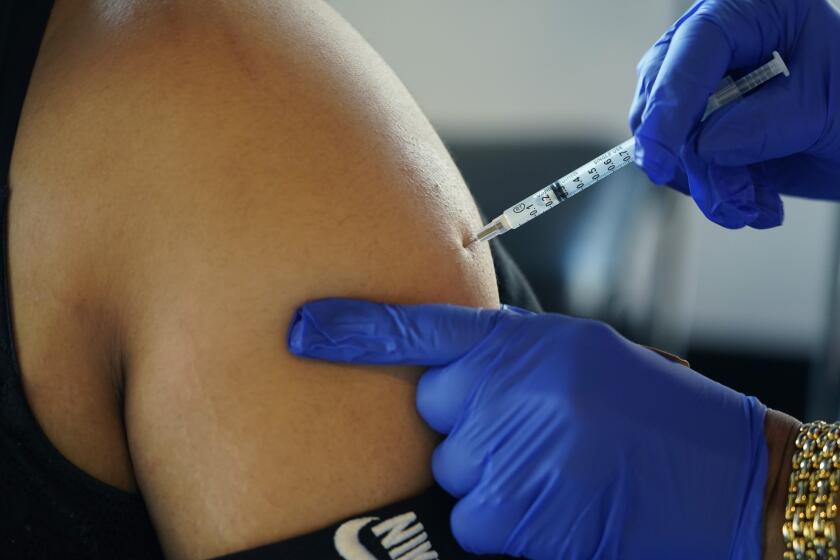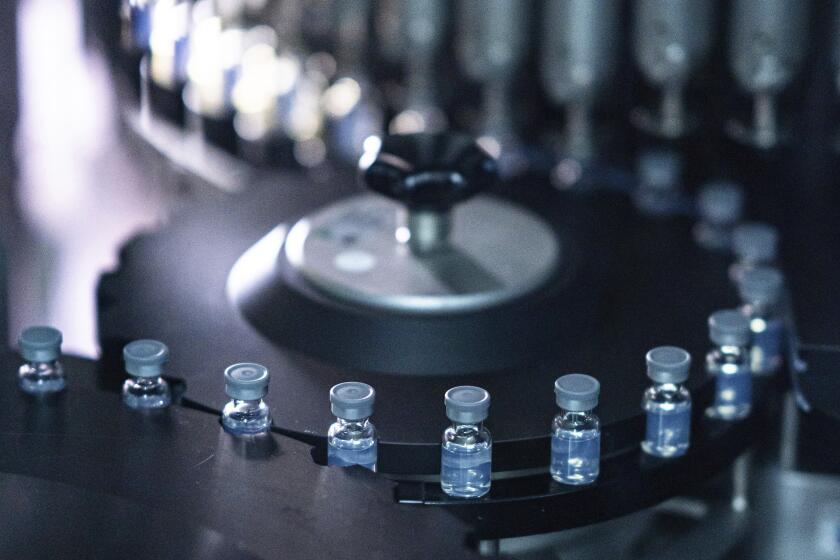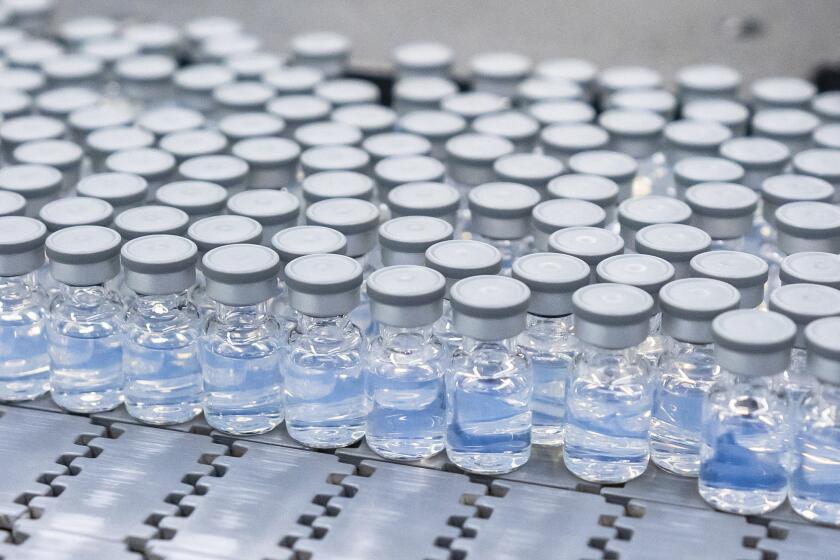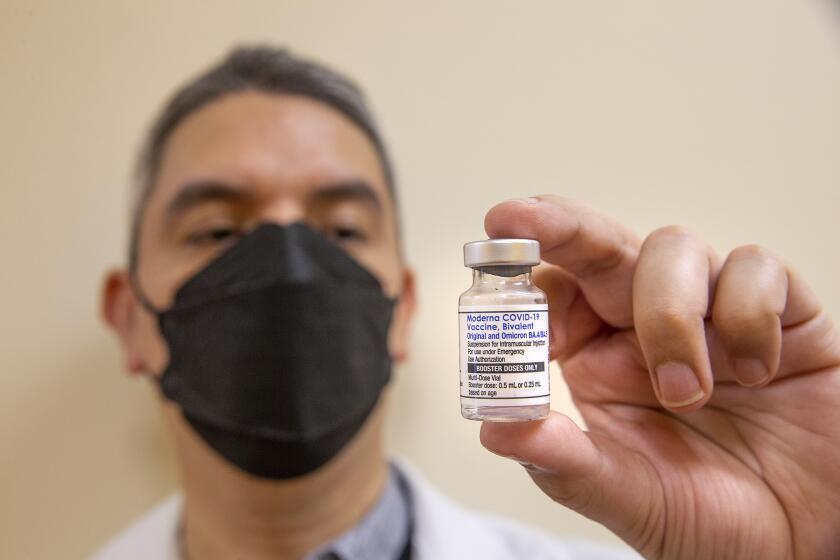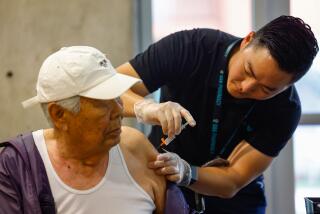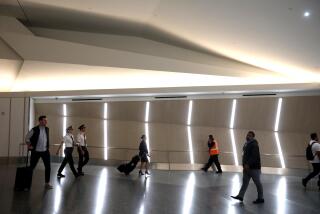Updated COVID boosters are now available for kids. Here’s how to get them
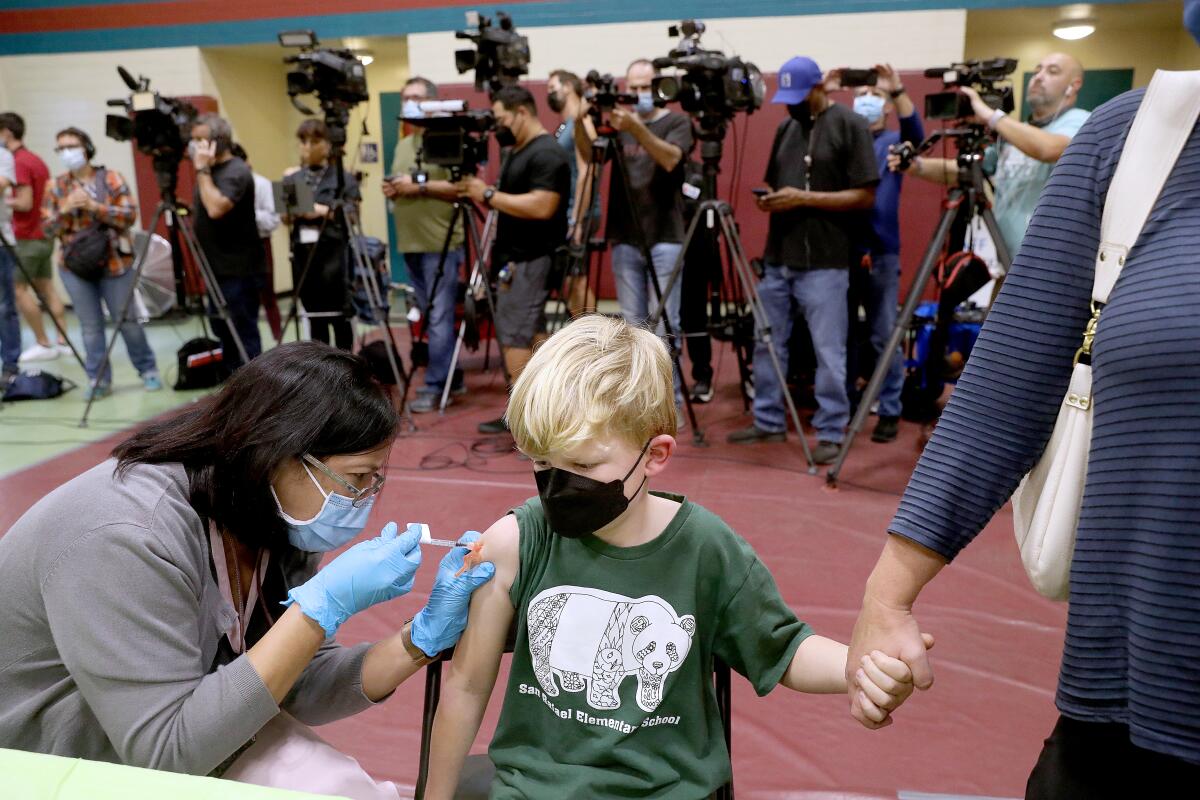
- Share via
Updated COVID-19 boosters are now available for children as young as 5, giving parents an option to amplify their kids’ protection heading into the pivotal winter months.
The latest shots, which are formulated specifically to target both the original strain of the coronavirus and the BA.5 Omicron subvariant that has dominated the U.S. for months, are being offered at hundreds of sites statewide.
“As is true of the other COVID-19 vaccine and booster doses, the updated boosters were designed to protect individuals from the worst outcomes of COVID-19, including hospitalization and death,” state Health and Human Services Secretary Dr. Mark Ghaly and Dr. Tomás Aragón, California’s public health director and state health officer, said in a joint statement.
“With the authorization of the updated booster to individuals as young as 5, we’re even closer to ensuring the whole family is protected as we head into the fall and winter, when the spread of respiratory viruses is at its peak.”
The updated bivalent COVID-19 booster shots are available at more than 1,500 sites in Los Angeles County. Here’s how to get one.
Here’s what you need to know:
When can someone get the updated booster?
Children, like adults, must have completed their primary vaccination series and be at least two months removed from their last vaccination or conventional booster dose before getting the additional shot.
What brands are available?
Both children and adults can choose between Pfizer-BioNTech or Moderna. Pfizer is available to those ages 5 and up, while children as young as 6 can get Moderna.
Officials note that the booster brand does not have to match your primary series. Someone who was initially vaccinated with Moderna, for example, is free to choose either that offering or Pfizer.
How can I make an appointment?
Parents can book vaccination appointments for their children using the state’s platform, MyTurn.ca.gov, or by calling (833) 422-4255. Walk-in clinics are also available and can be searched through the state site.
In Los Angeles County, officials are planning to offer the updated Pfizer boosters for children 5 and older at an estimated 625 sites starting as soon as Wednesday. Residents can search for locations at VaccinateLACounty.com. The Moderna shots, for ages 6 and up, are already available at some locations.
“Out of the nearly 900,000 children in L.A. County that are ages 5 to 11, there are over 500,000 children that have not yet received their primary series,” county Public Health Director Barbara Ferrer said. “A child can receive their primary series now and then receive the bivalent booster two months after their last dose. This will provide a significant amount of protection against Omicron during the upcoming winter holidays.”
The shots for those age 5 to 11 could be available in Los Angeles County as soon as Oct. 19.
Who reviewed the boosters?
Like previous COVID-19 vaccines, the boosters were reviewed by the U.S. Food and Drug Administration, which last week gave the green light for younger kids to receive the updated shots. The Centers for Disease Control and Prevention then formally recommended people 5 and older get an updated booster when eligible.
The Western States Scientific Safety Review Workgroup, a coalition of public health experts from California, Nevada, Oregon and Washington, also reviewed and officially concurred with the federal recommendation last week.
Why should I get the new booster for me or my child?
Officials note that the updated bivalent boosters are specifically designed against the dominant version of the coronavirus circulating nationwide. This, they say, provides more targeted protection in a manner that’s similar to that of the annual flu shot.
“We recognize that after almost two years of getting various doses of the vaccine, there’s confusion among many of us on what we need to do in order to be well-protected,” Ferrer said. “It is relatively simple: If it’s been more than two months since you received your last booster or your primary vaccine series, you are eligible for the new bivalent booster, which is the only vaccine that offers increased protection against Omicron.”
Pfizer and BioNTech said their bivalent booster produced more antibodies against the targeted Omicron strains than earlier versions of their vaccine.
Immunity, whether resulting from a vaccination or a previous coronavirus infection, also wanes over time, and getting a periodic booster is one of the best methods of reamplifying that protection.
“We understand that there may be COVID fatigue, but we cannot let our guard down,” the California Department of Public Health wrote in a statement to The Times. “Our statewide COVID-19 vaccination campaign is still working with community partners across the state to emphasize the importance of staying up-to-date on their COVID-19 vaccines and boosters.”
So far, though, many parents have opted against getting their younger children vaccinated. About 41% of California 5- to 11-year-olds have gotten at least one dose — a share that lags well behind every other age group, according to state data compiled by The Times.
“While it has largely been the case that COVID-19 tends to be less severe in children than adults, as the various waves of COVID-19 have occurred, more children have gotten sick with the disease and have been hospitalized,” Dr. Peter Marks, the FDA’s vaccine chief, said in a statement last week. “Children may also experience long-term effects, even following initially mild disease.”
As kids “have gone back to school in person and people are resuming pre-pandemic behaviors and activities, there is the potential for increased risk of exposure to the virus that causes COVID-19,” he added.
“Vaccination remains the most effective measure to prevent the severe consequences of COVID-19, including hospitalization and death,” Marks said.
A big question with the new COVID-19 vaccine: Can you mix brands? Here is what experts say
What about timing the shots?
With the packed fall and winter holiday season approaching, some residents may consider trying to time their shots to ensure maximum protection.
Officials note it takes two weeks for the full impact of the booster to kick in. Peak effectiveness will likely be in the four or five months following the shot, with the maximum efficacy one month after the injection, UC San Francisco infectious-disease expert Dr. Peter Chin-Hong said in a previous interview.
Given that timeline, many officials say now is the time to get boosted.
“Oftentimes you hear about people trying to time their vaccines — waiting until the flu cases have risen or until we are in the middle of a COVID surge,” Ferrer said. “Getting your COVID bivalent booster and your flu vaccine now, before there’s another winter surge, is your very best protection.”
Los Angeles County health experts are carefully watching a rise in coronavirus cases in Britain, France, Germany and Italy as a potential predictor for trending cases in the United States.
What has demand been like?
A bit more than 2.1 million people had received the bivalent booster statewide as of Oct. 11, according to data from the California Department of Public Health. By comparison, 21.9 million people — roughly 78% of all vaccinated recipients — are at least six months removed from their last dose.
“The risk for COVID-19 exposure and infection continues as a number of Californians remain unvaccinated and unboosted,” the state public health department wrote in its statement. “Real-world evidence shows that the COVID-19 vaccines protect individuals from severe illness, hospitalization and death. Public health officials urge Californians to get vaccinated and boosted as soon as they are eligible.”
Robust vaccine uptake, officials and experts say, would likely help blunt the impact of a potential coronavirus resurgence later this year. While pandemic conditions have steadily improved in recent months, the two worst previous COVID-19 waves both struck in the fall and winter, when the combination of colder temperatures and packed social and holiday calendars pushed many to travel and gather indoors.
“Increasing the number of individuals boosted with the bivalent booster offers us the most hope for avoiding the disruption and devastation associated with both prior winter surges,” Ferrer said.
More to Read
Sign up for Essential California
The most important California stories and recommendations in your inbox every morning.
You may occasionally receive promotional content from the Los Angeles Times.
